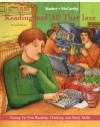 |
1 |  | 
What question can you ask to identify the general purpose? |
|  | A) | "What is the topic sentence?" |
|  | B) | "Why did the author write this?" |
|  | C) | "What did the author want to accomplish?" |
|  | D) | Both b and c. |
 |
 |
2 |  | 
Usually, which category does the author's purpose fall into?
|
|  | A) | to entertain
|
|  | B) | to inform
|
|  | C) | to persuade
|
|  | D) | All of the above.
|
 |
 |
3 |  | 
Which purpose is likely if the author tells a story or describes someone or something in an entertaining way, or appeals to the reader's imagination or sense of humor?
|
|  | A) | to entertain
|
|  | B) | to inform
|
|  | C) | to persuade
|
|  | D) | All of the above.
|
 |
 |
4 |  | 
Which purpose is likely if the author explains something to readers or provides them with knowledge they did not possess before? |
|  | A) | to entertain |
|  | B) | to inform |
|  | C) | to persuade |
|  | D) | All of the above. |
 |
 |
5 |  | 
Which purpose is likely if the author tries to change the reader's opinion by appealing to emotions or intellect?
|
|  | A) | to entertain
|
|  | B) | to inform
|
|  | C) | to persuade
|
|  | D) | All of the above.
|
 |
 |
6 |  | 
How can you determine whether the author's purpose is to entertain, inform, or persuade?
|
|  | A) | look for clues in the title
|
|  | B) | look for clues in the headings and subheadings
|
|  | C) | look for clues in the introduction or conclusion
|
|  | D) | All of the above.
|
 |
 |
7 |  | 
Writers take into account their __________________ when they choose their general purpose.
|
|  | A) | audience
|
|  | B) | their own interests
|
|  | C) | those they are writing for
|
|  | D) | Both a and c.
|
 |
 |
8 |  | 
Authors also usually have a _______________which gives more detailed information about the article than the _______________.
|
|  | A) | specific purpose, general purpose
|
|  | B) | general purpose, general purpose
|
|  | C) | primary purpose, secondary purpose
|
|  | D) | secondary purpose, primary purpose,
|
 |
 |
9 |  | 
Which is true about summarizing?
|
|  | A) | Summarizing means restating the main ideas in your own words.
|
|  | B) | A summary is much shorter than the original on which it is based.
|
|  | C) | A summary reports the author's viewpoints, not your own.
|
|  | D) | All of the above.
|
 |



 2003 McGraw-Hill Higher Education
2003 McGraw-Hill Higher Education